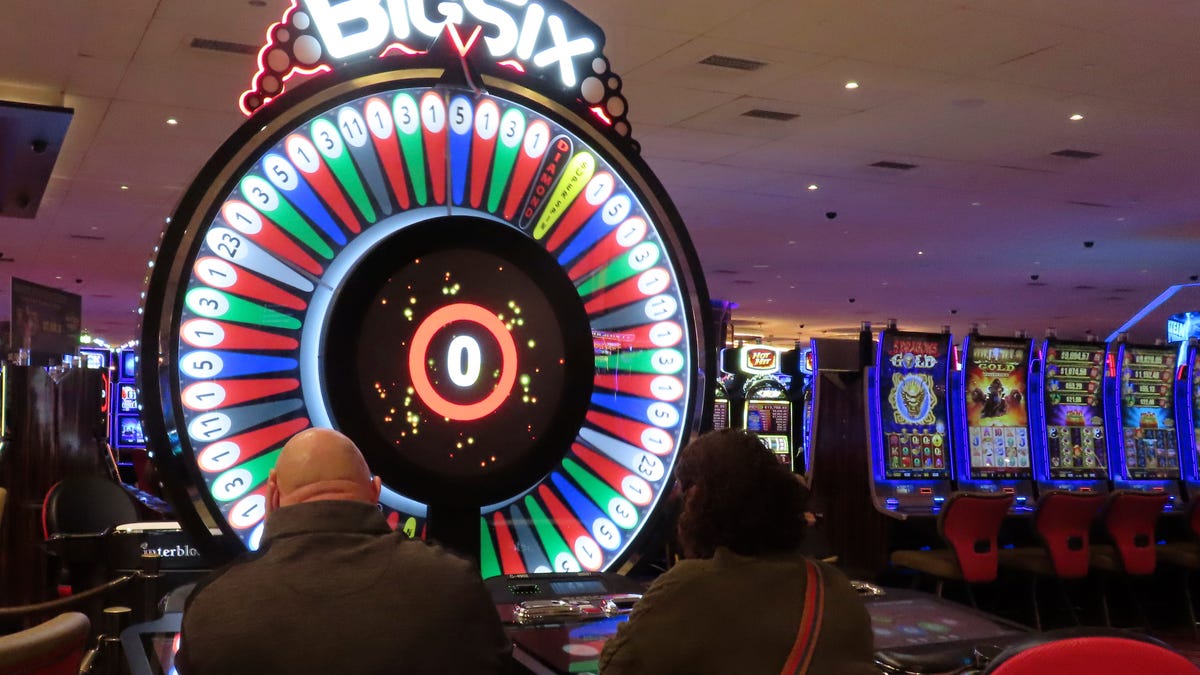New Jersey
A record-breaking January for New Jersey gambling, even as in-person casino winnings fall

ATLANTIC CITY, N.J. (AP) — Four major gambling revenue records were smashed in New Jersey in January as 2024 got off to a rousing start for everything except the thing casinos care about most: the amount of money won from in-person gamblers.
Internet gambling revenue, sports betting revenue, the total amount of money wagered on sports, and total casino-sports betting-internet revenue all set new records in January, according to figures released Friday by the state Division of Gaming Enforcement.
The total amount won by Atlantic City’s nine casinos, the three horse tracks that take sports bets, and their online partners was more than $559 million, up 28% from a year earlier.
Much of that was powered by a historic month of internet gambling ($183 million, up nearly 20% from a year ago) and sports betting (nearly $171 million, up more than 136%).
However, those revenue streams must be shared with third-party providers, including tech platforms and sports books, and that money is not solely for the casinos to keep. That is why the casinos consider their core business to be money won from in-person gamblers.
Harsher winter weather in January 2024 contributed to in-person casino winnings that were lower than January 2023, when the weather was milder, said Jane Bokunewicz, director of the Lloyd Levenson Institute at Stockton University, which studies the Atlantic City casino market.
“It’s likely brick-and-mortar activity was diverted to online channels, boosting the internet gaming and online sports betting totals,” she said.
The in-person total continues to decline, still lagging the levels seen before the COVID19 pandemic began in early 2020. In January, in-person casino winnings were just over $205 million, down 3.1% from a year earlier.
Collectively, that was higher than the total won from in-person gamblers in January 2019.
But it was due mainly to the strong performance of Atlantic City’s three newest casinos: the Borgata, Hard Rock and Ocean, which were the only three to win more from in-person gamblers in January than they did four years earlier. That means two-thirds of Atlantic City’s nine casinos are still not winning as much in-person money as they did before the pandemic hit.
“The success of online gaming and sports wagering continues to provide competitive advantage to operators even during Atlantic City’s traditional off-season,” said James Plousis, chairman of the New Jersey Casino Control Commission.
New Jersey’s casinos and tracks took $1.71 billion worth of sports bets in January, smashing the previous record of $1.62 billion set in November.
The Meadowlands Racetrack in East Rutherford, near New York City, won $113 million on sports bets, up 137% from a year ago. Monmouth Park in Oceanport, near the Jersey Shore, won nearly $2.4 million, up 8.5%, while Freehold Raceway lost over $1 million on sports bets compared to a $1.6 million win a year earlier.
In terms of combined in-person, internet and sports betting revenue, the Borgata took in $107.6 million, up 1.6%. Golden Nugget won $63.5 million, up over 23%; Hard Rock won $51.5 million, up 19%; Ocean won $39.1 million, up more than 13%, and Tropicana won $26.1 million, up 4.5%.
Bally’s won $18.9 million, up 15.3%; Harrah’s won $16.5 million, down 17.5%; Caesars won $15.1 million, down 7.6%; and Resorts won $10.8 million, down less than 1%.
Resorts Digital, the casino’s online arm, won $89.5 million, up over 69%, and Caesars Interactive NJ, another internet-only entity, won $5.7 million, down over 30%.
When just in-person winnings are counted, Borgata won $57.6 million, down 1.2%; Hard Rock won $37.3 million, up 3.9%; Ocean won just over $33 million, up 8.3%; Harrah’s won $15.9 million, down nearly 21%; Caesars won $15.5 million, down nearly 8%; and Tropicana won $13.3 million, down over 18%.
Golden Nugget won $11.2 million from in-person gamblers, up 2.3%; Resorts won $10.9 million, down 1.4%; and Bally’s won $10 million, down nearly 13%.
___
Follow Wayne Parry on X, formerly Twitter, at www.twitter.com/WayneParryAC

New Jersey
Newton hunts for lead pipes in town water system. What homeowners need to know

Here’s what you might find in your tap water
From lead to arsenic to PFAS, what’s lurking in your tap water? Here’s what you need to know about water quality in the U.S.
Just the FAQs, USA TODAY
NEWTON — The town may soon deploy swordfish to search its water lines for lead pipes, as it seeks to remove the hazardous metal from its more-than-century-old water system.
“Swordfish” is the brand name of a device that looks similar to a plumber’s snake used to clear drain clogs. A swordfish, however, has a probing wire tipped with an electrical device that, when it touches the insides of a pipe, can tell whether it is made of lead, copper, galvanized steel or plastic.
High lead levels in drinking water can cause a range of health problems, including lasting damage to brain development in children. Gov. Phil Murphy signed a law in 2021 that requires community water systems in New Jersey to identify all lead service lines, notify the public about their presence and then replace those pipes by 2031.
Newton’s water system owns the water lines that split off its water mains up to the connection to individual property owner service lines. It is those final connecting lines that need to be tested throughout the town, potentially via Swordfish.
Towns, homeowners split responsibility for lead abatement
Those service lines are the responsibility of the individual property owners and could cost from $8,000 to $12,000 per line for replacement, town officials said at Monday’s council meeting, though there is some state money available to defer the costs.
It’s up to the town to identify those lead pipes, however, and officials said Monday that the Swordfish technology could make that process more efficient and less disruptive.
The council has scheduled a public hearing for its May 29 meeting on an ordinance to spend $90,000 for two of the devices. Without them, crews most often need to dig a hole in a lawn or through a sidewalk or road, to get to the connecting lines.
With the Swordfish, the operator can “fish” a wire through a connector box or main and reach a service line. The contacts are engaged and a readout identifies the material in the service pipe. A sample of the inside of the pipe is also taken by the probe and tested.
Hundreds of service lines must be tested
At Monday’s meeting, Town Manager Tom Russo and Town Engineer Dave Simmons briefed the council on their progress and the need for the Swordfish technology. According to figures from manufacturer Electroscan Inc., a single Swordfish unit costs $78,000, plus training. However, two units cost just $90,000 for the pair.
Already, Newtown has identified about 1,000 town-owned service lines, but there are more than 1,700 more to be checked, Russo and Simmons said.
More: EPA announces new drinking water standards. How could NJ water systems be impacted?
Of the 1,000 service lines already investigated, all but 253 contained lead. Some of the branch lines need to be checked as well for the presence of lead piping and 62 of those have been “verified” as lead-free on both sides of the connection.
Water department supervisor Ken Jackel said the average cost to dig an inspection hole is $350 and the town has been using three employees each from the water and sewer department, augmented by DPW employees to do the inspection work now.
Digging up properties
“We have run out of the ‘low-hanging fruit’, said Simmons. “Now, we need to do the field inspections.”
A Swordfish can be operated by 1 to 2 person teams.
In addition to the cost in manpower and time of digging inspection holes, there is the post-inspection issue of replacing landscaping or structures which must be moved to get access to the service line connection. In the more urban section of town, notably along Spring Street, digging also requires jackhammers and refilling the inspection hole with dirt, asphalt or concrete.
There are additional costs as well in areas where the town needs to obtain permits from the state or Sussex County to do work on their highways to access service lines for visual inspection.
Jackel noted that in most locations, crews can access the service line through the property owner’s water meter connection, eliminating the need to dig a hole in a lawn or sidewalk. In some areas, access to service lines can be made at curb-side waterline connection boxes.
The Swordfish apparatus has not been formally approved by New Jersey, but is approved in the states of New York and Pennsylvania. He also noted that the City of Baltimore is using the technology.
There is no prohibition against use of the device in New Jersey, Jackel said, adding, “It’s up to us.”
With the Swordfish units, the department estimated the crews could test 10-20 customers per day. Russo said he would like to get all the testing and inspection done within the next 18 months.
Newton water system dates back to 1895
Newton’s water system dates to 1895 and begins at Morris Lake in Sparta. There is a treatment plant at the dam which creates the reservoir.
The water main follows Sparta Glen Brook then moves underground along Sparta Road. There is only a couple of customers before the main line enters the town and branches out through 10-inch cast iron mains, feeding the branches which then feed individual service lines make connections to users.
After the presentation, the council voted to approve an ordinance which will go to first reading at the May 29 meeting. If approved at that meeting, a public hearing is likely to be scheduled for the June 10 council meeting after which the council could approve the purchase of units.
Email: bscruton@njherald.com Twitter/X: @brucescrutonNJH
412,000
New Jersey
Gold bars in baggies and cash crammed in boots: Prosecutors detail Menendez's hoarded riches • New Jersey Monitor

Peek into Sen. Bob Menendez’s closets and basement, and you’ll learn he’s secretly a slob, with his and his wife’s belongings strewn around as if a typhoon just blew through.
But in 2022, that chaos hid something worse, federal prosecutors said Thursday — proof of his corruption. Jammed into jackets and boots and crammed into bags and boxes were 13 gold bars and $486,461 in cash, the fruits of five years of bribes New Jersey’s senior senator and his wife took from three businessmen hungry for Menendez’s influence, prosecutors said.
On the fourth day of the Democratic senator’s corruption trial in Manhattan, prosecutor Lara Pomerantz spent several hours chronicling the cash, gold, and other items FBI agents found during a June 16, 2022, search of the couple’s Englewood Cliffs home.
Aristotelis Kougemitros, the FBI special agent who led the search, narrated photos of the senator’s home and its hoarded riches, and Pomerantz gave the confiscated cash and gold, sealed in evidence bags, to jurors for inspection.
Investigators found so much money in envelopes — banded together in stacks or loose in bags — that they quit photographing it and Kougemitros called for backup, he testified. Two agents arrived with an automated cash counter.
“The sheer volume of bills that we encountered was too much to count by hand,” he said.
Thursday, Pomerantz and Kougemitros took so long to list all the loot investigators found around the Menendezes’ split-level home that U.S. District Judge Sidney H. Stein stood up to stretch his legs.
Menendez lawyer Avi Weitzman had told jurors on Wednesday that the senator’s wife, Nadine, took the cash, gold, and other bribes without her husband’s knowledge and stashed much of it in her deadbolted closet and the locked safe inside it.
The senator had a habit of keeping cash at home, rooted in his experience as the son of immigrants who fled Cuba with nothing, Weitzman added. Check the money’s date, he told jurors, saying they were older bills long out of circulation that would prove Menendez collected them over decades.
On Thursday, Pomerantz clearly sought to deflate that defense. She showed seized stacks of hundred-dollar bills with April 2022 dates stamped on the bank’s band. She told jurors most of the money was found packed into pockets of the senator’s coats and in bags in the commonly accessible basement.
The closet in question became a point of debate, with Kougemitros insisting investigators found Menendez’s navy blazer and men’s ties hanging inside the closet, suggesting it was a shared space.
But Adam Fee, a Menendez attorney, pushed back on cross-examination, countering that the blazer was hanging on the back of the master bedroom door, not inside the closet, which he said was Nadine’s alone.
The men’s ties? They belonged to a teenager who used to live in the home, Fee said, pointing to the skulls and cheese-eating mice dotting several ties. Nadine Menendez had two children from a previous marriage, including a son named Andre.
Fee asked Kougemitros if he’d ever seen the senator wear such sassy ties.
“In fairness, I haven’t really studied photos of Senator Menendez wearing ties,” Kougemitros responded.
In court, Menendez’s ties have leaned patriotic, every day a different variation of red and blue.
Cash aside, all the gold bars the FBI seized were found in the closet, Fee said. Whoever put them there didn’t worry about their storage, photos showed. One was wrapped in a paper towel, shoved in a Ziploc bag, and left on the floor beneath other detritus.
Beyond the cash, gold bars, jewelry, air purifier, and fitness machine the couple allegedly accepted as bribes, the FBI’s photos show the couple liked luxury brands, with bags branded Prada, Giorgio Armani, Burberry, and more making appearances in the pictures.
Menendez listened to the testimony without much of a reaction, occasionally resting his cheek in his palm.
Criminalizing friendship?
Before Pomerantz called Kougemitros as the case’s first witness, the attorneys for Menendez’s two co-defendants — Wael “Will” Hana and Fred Daibes — delivered their opening statements.
Hana is an Egyptian-American businessman and longtime friend of Nadine Menendez who prosecutors say bribed the couple with gold and cash to help him gain a monopoly on exporting halal meat to Egypt, free up military arms and aid to Egypt, and supply sensitive U.S. government information to Egyptian officials.
Daibes is an Edgewater real estate developer who prosecutors say gave Menendez gold and cash to disrupt a bank fraud investigation into him by the U.S. Attorney’s Office in New Jersey and help him land a lucrative investment from a member of Qatar’s royal family.
Attorney Lawrence Lustberg, who represents Hana, told jurors prosecutors were making innocent actions look sinister by criminalizing friendships, commercial success, and advocating for one’s homeland.
Hana had been close friends with Nadine Menendez for 15 years and gave her gifts out of friendship, Lustberg said. Gold is a gift people particularly from the Middle East like to give, he added.
“Will’s gifts got nicer as his business succeeded,” Lustberg said.
Prosecutors say Hana also gave Nadine Menendez a low- or no-show job at his meat exporting business as a bribe. Lustberg conceded Hana paid her three $10,000 checks to help him set up operations in other countries as his business expanded. But she didn’t do the work, so “he fired her,” he added.
“Ask yourself – is this what a briber does?” Lustberg said.
Attorney Cesar de Castro, who represents Daibes, echoed Lustberg’s sentiment, saying prosecutors were “sensationalizing” gift-giving. This is the argument Menendez and his friend and co-defendant, Salomon Melgen, made during their 2017 corruption trial, which ended in a hung jury.
“Investing in precious metals like gold is normal and common … gold is even sold at Costco,” de Castro said. “There’s nothing criminal about being generous.”
Fee is expected to resume his cross examination of Kougemitros Friday. Prosecutors have indicated they plan to call an FBI agent to testify Monday to talk about Menendez’s actions in Egypt.
A cancer diagnosis
While Menendez treks to Manhattan daily to fight his second corruption case in the past decade, his wife has been home battling a medical crisis that prompted Stein to postpone her trial to at least July.
Thursday, as de Castro was defending Daibes, Menendez’s Senate staff sent out a statement revealing that Nadine Menendez has stage III breast cancer and needs a mastectomy, follow-up surgery, and possibly radiation treatment.
In the statement, Menendez said his wife decided to ask him to disclose her medical condition “as a result of constant press inquiries and reporters following my wife.”
“We are of course, concerned about the seriousness and advanced stage of the disease,” he said in the statement. “We hope and pray for the best results. We ask the press and the public to give her the time, space and privacy to deal with this challenging health condition as she undergoes surgery and recovery.”
GET THE MORNING HEADLINES DELIVERED TO YOUR INBOX
New Jersey
Unemployment claims in New Jersey declined last week

Initial filings for unemployment benefits in New Jersey dropped last week compared with the week prior, the U.S. Department of Labor said Thursday.
New jobless claims, a proxy for layoffs, fell to 8,117 in the week ending May 11, down from 8,409 the week before, the Labor Department said.
U.S. unemployment claims dropped to 222,000 last week, down 10,000 claims from 232,000 the week prior on a seasonally adjusted basis.
Louisiana saw the largest percentage increase in weekly claims, with claims jumping by 26.0%. New York, meanwhile, saw the largest percentage drop in new claims, with claims dropping by 40.5%.
The USA TODAY Network is publishing localized versions of this story on its news sites across the country, generated with data from the U.S. Department of Labor’s weekly unemployment insurance claims report.
-

 Politics1 week ago
Politics1 week ago'You need to stop': Gov. Noem lashes out during heated interview over book anecdote about killing dog
-

 News1 week ago
News1 week agoMan, 75, confesses to killing wife in hospital because he couldn’t afford her care, court documents say
-

 Politics1 week ago
Politics1 week agoRFK Jr said a worm ate part of his brain and died in his head
-

 World1 week ago
World1 week agoPentagon chief confirms US pause on weapons shipment to Israel
-

 Politics1 week ago
Politics1 week agoHere's what GOP rebels want from Johnson amid threats to oust him from speakership
-

 World1 week ago
World1 week agoPro-Palestine protests: How some universities reached deals with students
-

 World1 week ago
World1 week agoConvicted MEP's expense claims must be published: EU court
-

 Politics1 week ago
Politics1 week agoCalifornia Gov Gavin Newsom roasted over video promoting state's ‘record’ tourism: ‘Smoke and mirrors’




















